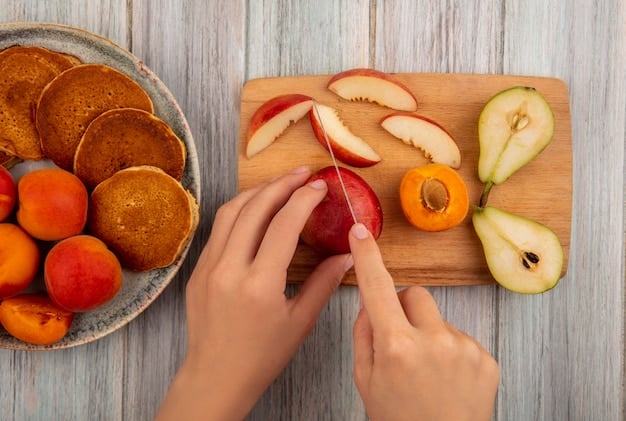The Truth About Sugar: How Much Is Too Much for Your Health?

The Truth About Sugar: How Much Is Too Much and What Are the Health Risks? Excessive sugar consumption can lead to numerous health issues, including weight gain, type 2 diabetes, heart disease, and liver damage, highlighting the importance of understanding recommended daily limits and making informed dietary choices.
Unraveling **the truth about sugar: How much is too much and what are the health risks?** Discover how to navigate the sweet maze for a healthier you.
Understanding Sugar: A Basic Overview
Sugar is a ubiquitous part of our diets, found naturally in fruits and added to countless processed foods. Before diving into the risks, let’s understand what sugar is and why we crave it.
Sugar, in its simplest form, is a type of carbohydrate that provides energy to our bodies. It comes in various forms, including glucose, fructose, and sucrose, each with different metabolic effects.
Types of Sugars
Understanding the different types of sugars is crucial for making informed dietary choices. Each type affects your body differently.
- Glucose: The primary sugar used by the body for energy.
- Fructose: Found naturally in fruits and honey, it’s sweeter than glucose.
- Sucrose: Common table sugar, composed of glucose and fructose.
- Lactose: The sugar found in milk and dairy products.
The source of the sugar matters. Naturally occurring sugars, like those in fruits, come with fiber, vitamins, and minerals, which mitigate their negative effects. Added sugars, on the other hand, provide empty calories without nutritional benefits.
In conclusion, sugar isn’t inherently bad, but the type and amount we consume significantly impact our health. Recognizing the different forms of sugar and their sources is the first step in making healthier choices.
The Recommended Daily Intake of Sugar
Knowing how much sugar is too much can be tricky, given its prevalence in our food supply. Health organizations provide guidelines to help us stay within safe limits. Let’s explore the recommended daily intake.
Major health organizations, such as the American Heart Association (AHA) and the World Health Organization (WHO), have set specific guidelines for added sugar consumption. These recommendations are based on extensive research into the health impacts of excess sugar.
AHA and WHO Guidelines
Following these guidelines can significantly reduce your risk of developing sugar-related health issues.
- American Heart Association (AHA): Recommends no more than 6 teaspoons (25 grams) of added sugar per day for women and 9 teaspoons (36 grams) per day for men.
- World Health Organization (WHO): Suggests limiting added sugar intake to less than 10% of total daily calories, ideally less than 5% for additional health benefits.
It’s important to note that these recommendations refer to added sugars, not the sugars naturally found in fruits and vegetables. These natural sugars come with beneficial nutrients and fiber, making them a healthier option.
In conclusion, being mindful of the recommended daily intake of added sugars is crucial for maintaining good health. By staying within these limits, you can significantly reduce your risk of developing various health complications associated with excessive sugar consumption.

Hidden Sugars in Everyday Foods
Sugar is not always obvious; it often hides in unexpected places. Recognizing these hidden sugars is key to reducing your intake. Let’s uncover where sugar lurks in our everyday foods.
Many processed foods contain added sugars that we might not be aware of. These sugars can significantly contribute to our daily intake without us realizing it.
Common Sources of Hidden Sugars
Knowing where these hidden sugars are found can help you make better choices when grocery shopping.
- Sauces: Ketchup, salad dressings, and barbecue sauce often contain high amounts of added sugar.
- Processed Foods: Bread, yogurt, and cereals can be surprisingly high in sugar.
- Drinks: Juices, smoothies, and flavored beverages are notorious for their sugar content.
Reading food labels is essential for identifying hidden sugars. Look for ingredients like high fructose corn syrup, sucrose, glucose, and dextrose. These are all forms of added sugar.
Reading food labels can be confusing, but focusing on the “added sugars” section of the nutrition facts panel can provide clarity. This will help you accurately assess the amount of added sugar in each serving.
In conclusion, being vigilant about hidden sugars in everyday foods is crucial for managing your sugar intake effectively. By reading labels and choosing whole, unprocessed foods, you can significantly reduce your consumption of added sugars and improve your overall health.
The Health Risks of Excessive Sugar Consumption
Consuming too much sugar can lead to a variety of health problems. Understanding these risks can motivate us to make healthier choices. Let’s delve into the health risks associated with excessive sugar consumption.
Excessive sugar intake is linked to several chronic diseases and health conditions. These risks range from weight gain to more severe issues like heart disease and diabetes.
Major Health Risks
Knowing these risks can help you make informed decisions about your sugar consumption.
- Weight Gain and Obesity: Excess sugar is converted into fat, leading to weight gain and increasing the risk of obesity.
- Type 2 Diabetes: High sugar intake can lead to insulin resistance, increasing the risk of developing type 2 diabetes.
- Heart Disease: Excessive sugar consumption is linked to higher levels of triglycerides, a risk factor for heart disease.
- Liver Damage: The liver can be damaged by processing large amounts of fructose, leading to non-alcoholic fatty liver disease.
In addition to these major risks, excessive sugar intake can also contribute to other health problems such as tooth decay, inflammation, and an increased risk of certain types of cancer.
In conclusion, the health risks of excessive sugar consumption are significant and far-reaching. By understanding these risks and making conscious efforts to reduce your sugar intake, you can protect your health and well-being.

Strategies for Reducing Sugar Intake
Cutting back on sugar can seem daunting, but small, sustainable changes can make a big difference. Let’s explore effective strategies for reducing sugar intake.
Reducing sugar intake involves making conscious choices and adopting healthier habits. These strategies can help you gradually lower your sugar consumption without feeling deprived.
Practical Tips for Reducing Sugar Intake
Here are some actionable tips to help you cut back on sugar:
- Read Labels Carefully: Pay attention to the “added sugars” section on nutrition labels.
- Choose Whole Foods: Opt for fruits, vegetables, and whole grains over processed foods.
- Limit Sugary Drinks: Replace sodas, juices, and sweetened beverages with water, unsweetened tea, or sparkling water.
- Cook at Home: Preparing your meals allows you to control the ingredients and reduce the amount of sugar added.
Another effective strategy is to gradually reduce the amount of sugar you add to foods and beverages. For example, if you usually add two teaspoons of sugar to your coffee, try reducing it to one and a half, then one, and so on.
In conclusion, reducing sugar intake is achievable with the right strategies and mindset. By implementing these practical tips, you can gradually lower your sugar consumption and enjoy a healthier, more balanced diet.
The Role of Artificial Sweeteners
Artificial sweeteners are often marketed as a healthy alternative to sugar, but are they truly beneficial? Let’s examine the role of artificial sweeteners in our diet and their potential impacts.
Artificial sweeteners are synthetic or natural substances that provide a sweet taste without the calories of sugar. They are used in many products, including diet sodas, sugar-free candies, and processed foods.
Pros and Cons of Artificial Sweeteners
While they may seem like a good option, it’s important to weigh the pros and cons.
- Pros: They can help reduce calorie intake and may be useful for people with diabetes who need to manage their blood sugar levels.
- Cons: Some studies suggest that artificial sweeteners may disrupt gut bacteria and increase cravings for sweet foods.
It’s important to note that not all artificial sweeteners are created equal. Some, like stevia and erythritol, are considered more natural and may have fewer potential side effects compared to artificial sweeteners like aspartame and sucralose.
The long-term health effects of artificial sweeteners are still being studied. It’s important to use them in moderation and be aware of any potential side effects.
In conclusion, artificial sweeteners can be a helpful tool for reducing sugar intake, but they are not a perfect solution. It’s important to use them in moderation and consider the potential risks and benefits before incorporating them into your diet.
| Key Point | Brief Description |
|---|---|
| 🍬 Sugar Types | Glucose, fructose, sucrose, and lactose affect the body differently. |
| ⚠️ Daily Limits | AHA recommends max 6-9 teaspoons added sugar daily. |
| 🥤 Hidden Sugars | Found in sauces, processed foods, and sweetened drinks. |
| 🍎 Healthy Swaps | Choose whole foods, limit sugary drinks, and cook at home. |
Frequently Asked Questions (FAQ)
▼
Natural sugars are found in fruits and vegetables and come with beneficial nutrients. Added sugars are added to processed foods, providing empty calories without nutritional value.
▼
Look for the “added sugars” section on the nutrition facts panel. Also, check the ingredient list for sources like high fructose corn syrup, sucrose, glucose, and dextrose.
▼
Consider using natural sweeteners like stevia, erythritol, or monk fruit in moderation. Also, try flavoring foods with spices like cinnamon or vanilla instead of sugar.
▼
Artificial sweeteners can reduce calorie intake, but they may not directly lead to weight loss. Some studies suggest they can disrupt gut bacteria and increase cravings for sweet foods.
▼
Eat regular, balanced meals to avoid blood sugar spikes and crashes. Choose whole, unprocessed foods and stay hydrated. Getting enough sleep and managing stress can also help reduce cravings.
Conclusion
Understanding the truth about sugar and its impact on our health is crucial for making informed dietary choices. By being mindful of our sugar intake, reading food labels carefully, and adopting healthier habits, we can reduce our risk of developing sugar-related health issues and enjoy a healthier, more balanced life.





